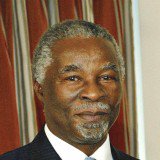Global Witness has long been saying how transparency is a means of curbing corruption (like here and here), and so it was good to read at the weekend that the African Union agrees with us on lots of this. In particular, they’ve called for the identity of the real, so-called ‘beneficial’ owners of companies to be made public for all to see (as well as also calling for more mandatory transparency in the oil, gas and mining sectors). It’s the first time that African countries have spoken out in unison about how financial crimes hurt ordinary people.
 The report in question came from a High Level Panel of the African Union (AU) and the UN Economic Commission for Africa (UNECA). The panel is chaired by Thabo Mbeki and its members include Raymond Baker, the Director of Global Financial Integrity which Global Witness works with as part of the Financial Transparency Coalition.
The report in question came from a High Level Panel of the African Union (AU) and the UN Economic Commission for Africa (UNECA). The panel is chaired by Thabo Mbeki and its members include Raymond Baker, the Director of Global Financial Integrity which Global Witness works with as part of the Financial Transparency Coalition.
The panel’s headline finding is that Africa loses between $30 billion and $60 billion in illicit financial outflows every year. “These lower-end figures indicated to us that in reality Africa is a net creditor to the world rather than a net debtor,” they said. In other words, even if you take the smaller, more conservative estimate of the amount of money that Africa loses, it is still bigger than the amount of money the continent receives in aid. That’s a jaw-dropping fact – something that is totally opposite to the perceived reality of rich countries helping to finance poor ones – and it deserves to be far more widely known.
Anonymously owned companies are one of the methods used to move all this illicit money out of Africa. They’re used by the criminal and the corrupt to hide their assets from the police or from the tax authorities.
In order to help stop this, the panel recommends that all countries should require information on the beneficial owners of companies and trusts to be obtained on formation, regularly updated and made available to the public. Their recommendations don’t just apply to African countries, but to the rich world countries such as the U.S. as well as the world’s more infamous secrecy jurisdictions. The panel also suggests that all companies that enter into contracts with governments – an area where corruption is particularly rife – should have to declare who their beneficial owners are. Global Witness agrees wholeheartedly. Leaders in other parts of the world take notice: anonymous companies harm development and the solution is to create public registries of beneficial ownership.
Photo credit: Antônio Milena/ABr, 27 October 2003, available from http://commons.wikimedia.org/wiki/File:SthAfrica.ThaboMbeki.01.jpg